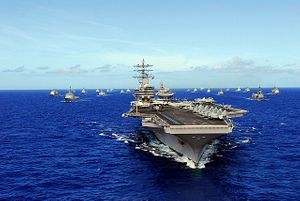In reaction to the revelations during a House Armed Services Committee hearing that the Navy will not have the capabilities to provide a “continuous” aircraft carrier presence in both the Middle East and the Asia-Pacific until 2021, Republican representative Mike Conaway of Texas introduced legislation to increase the number of operational aircraft carriers in the U.S. Navy fleet mandated by law from 11 to 12.
“The USS John F. Kennedy (CVN-79) can be scheduled for completion in 2023, at which point the U.S. Navy will again have 12 operational aircraft carriers. The number of carriers mandated by Congress should match shipbuilding plans already in place in order to set the standard for the future,” he said in a press release.
“Since World War II, the U.S. Navy has depended on its aircraft carriers to provide forward presence and power projection. From the Korean War until 2000, the Joint Chiefs of Staff aimed to maintain a 15-carrier Navy. However, declining military budgets forced the Navy to reduce to 12 aircraft carriers by 1998, and to 11 aircraft carriers by 2007. Congress then set the number at 11 to prevent even further reductions,” the congressman stated.
“Today, there is a gap in carrier presence in the Persian Gulf as the Iran nuclear deal goes into effect, and Navy acquisition chief Sean Stackley testified before a House Armed Services Subcommittee hearing today that gaps in presence will continue until 2021.”
Similar to some of his fellow lawmakers (some of whom I previously labelled strategic hedgehog-tactical fox hybrid analysts), Conaway is concerned over the relative decline of U.S. military power and the lack of resolve vis-à-vis the United States’ adversaries in the world (e.g., China and Russia):
Our adversaries threaten our freedom of the seas and doubt America’s military might. Now is the time to show strength and resolve to both our military members and to the international community by raising the number of operational aircraft carriers so that the U.S. Navy can meet its commitments at home and abroad.
As I noted before (See: “What Hawks Have to Say About the US Navy’s New Maritime Strategy”), this is one of the usual straw man arguments used by hedgehog analysts suffering from the “Gathering Storm Syndrome” (I wrote about it here and here), and fails on many analytical levels.
It will also be difficult in times of budget austerity to argue for yet another vulnerable weapons platform costing on average $13 billion in taxpayers money (See: “Closest Encounter Since 2006: Chinese Submarine Tailed US Aircraft Carrier”).
Additionally, from a pure “signalling resolve” perspective, the world’s most powerful navy does not need to “show” its resolve and strengths; rather, let the Navy’s capabilities and size speak for itself. The difference between 11 or 12 carriers is largely irrelevant in that regard—the U.S. Navy will remain the unchallenged ruler of the waves, even with “merely” ten operational aircraft carriers. One or two carriers less will not substantially affect Chinese or Russian calculations and increase their aggressiveness on the world’s oceans.
Furthermore, many analysts have repeatedly argued that aircraft carriers as used today are obsolete given the burgeoning anti-access/area denial capabilities (A2/AD) developed by states such as China, Iran and Russia. For example, a recently published report by the Center for New American Security states the U.S. Navy “faces a future in which its increasingly expensive carriers have been rendered ineffective by defensive systems being developed, fielded, and exported by our competitors (…).”
Nevertheless, the author does note that there “are paths back to relevance for these symbols of national greatness if the Navy makes the right investments. New capabilities in the areas of unmanned systems, stealth, directed energy, and hypersonics could be combined to provide the range required to perform deep strike missions.”
However, this would require a major shift in strategy, and something that is, unfortunately, not addressed in the current proposal by representative Conaway.

































